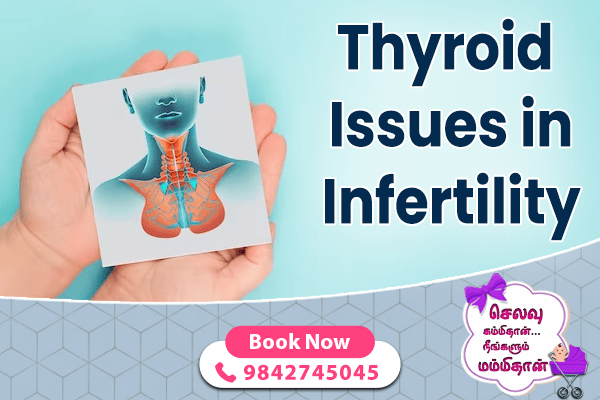Thyroid disease and infertility: What you need to know
Infertility in couples is much more common than you think. There are various causes for infertility both in males and females. However, if the reason behind it is by medical issue like thyroid disease, a fertility specialist can help in your chances of conceiving by treating it.
Understanding Thyroid gland and its hormones
Thyroid gland is a butterfly shaped gland present in the neck in the midline on the trachea. It secretes important hormones like T3 (Tri-iodo thyronine) and T4 (Thyroxine). Any dysfunction in these hormones as well as other hormones that act on thyroid like TSH (Thyroid Stimulating Hormone – secreted by pituitary gland) leads to abnormal working/ metabolism causing hormonal imbalance. Thyroid hormones are responsible for controlling the metabolism, such as how fast the heart beats and how quickly the calories are burnt. It also controls the menstrual cycle and ovulation which leads some women to experience irregular periods, infertility and even early menopause.
Thyroid disease and infertility
Undiagnosed or untreated thyroid disease can be a cause of infertility as well as sub fertility. Thyroid dysfunction can affect fertility in various ways resulting in anovulatory cycles, luteal phase defect, high prolactin (PRL) levels and sex hormone imbalances. Therefore normal thyroid function is necessary for fertility, pregnancy and to sustain a healthy pregnancy, even in the earliest days after conception. An underactive thyroid (hypothyroidism) can lead to low fertility. Because your thyroid gland is responsible for your ovulation, low levels of thyroid hormones can interfere with the ovaries. If egg is not released, or your ovulation cycle is irregular, it can make conception difficult.
Diagnosis of thyroid issues in infertility
Thyroid evaluation should be done in any women who is trying to get pregnant or is pregnant or has a family history of thyroid problem or irregular cycle or had more than two miscarriages or is unable to conceive after 1 year of unprotected intercourse. Thyroid should be evaluated for T3, T4, TSH and thyroid autoimmune testing such as antibodies against TPO (Thyroid Peroxidase), thyroglobulin/ antithyroglobulin antibodies and Thyroid Stimulating Immunoglobulin(TSI). Presence of thyroid antibodies doubles the risk of recurrent miscarriages in women with otherwise normal thyroid function.
Among the thyroid diseases, hypothyroidism has been shown to be a common cause of infertility and habitual abortion. Hypothyroidism can be easily detected by assessing TSH levels in blood. A slight increase in TSH with a normal T3 and T4 is called as subclinical hypothyroidism where as high TSH with low T3 and T4 indicates clinical hypothyroidism. Subclinical hypothyroidism is more common and can cause anovulation directly or by elevation in prolactin. It is extremely important to treat women with thyroid conditions first before evaluating and treating for other hormonal imbalances like hyperprolactinemia.
Treatment
Thyroid dysfunction is a common cause of infertility which can be easily managed by correcting the appropriate levels of thyroid hormones. Normal TSH levels are a prerequisite for fertilisation. Hormonal treatment with thyroxine is the treatment choice in established hypothyroidism. It normalizes the menstrual cycle, prolactin levels and improves the fertility rate. Therefore with simple oral treatment for hypothyroidism, it is possible to conceive after 6 months to 1 year of therapy.
If you are trying to conceive, our doctors can work with you to make sure your hormones are balanced, giving you a higher chance of being able to successfully conceive and maintain a healthy pregnancy. Get in touch with our team for further assistance.

